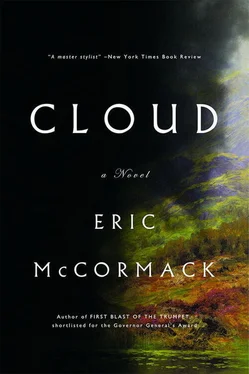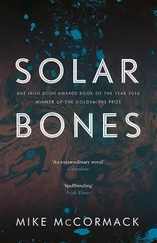“Take this along with you,” he said. “You’ve lots of time to get to know the contents. There’s nothing to it.”
AS I WAS LEAVING, I thanked him for all his reassurance.
“I have a feeling you’ll enjoy it here,” he said.
He lumbered along beside me to the door of the school. “When I get back from this Board of Education assignment, we’ll get together,” he said. “I often go to the Bracken for a pint in the evenings, if you’d like that. I’m getting married in October so I’ll be trying to make the most of my freedom while it lasts. Did I say a pint? Maybe we’ll have more than one.” He laughed — a reedy but pleasant sound.
He was so massive I guessed he could put away a fair number of pints without much trouble.
On most of the days following, I’d head up into the hills with a bag holding a waterproof shell in case of rain, the textbook Sam had given me, and a sandwich from Mackenzie’s, where everyone seemed to know I was the new teacher. I’d walk for a few miles and find myself a clear spot amongst the gorse bushes to sit down. After an hour or two of reading, I’d get out my sandwich. Invariably, at that point, a swarm of those small black birds with the white streaks on their wings would appear, shrieking and swooping. They were so bold I’d have to swat at them with my book to stop them from snatching the bread out of my hand.
Often, on those days, I’d make for a big rock I’d noticed on my first walk. It was an oddity up in the high moors — a lone, twenty-foot-high boulder, just sitting there with no other noticeable rocks around. Its northern side was smooth and mossy. But some indentations for climbing had been sculpted into its south face, and I made use of them. I discovered that the top of the rock was concave — a mossy depression four feet in width and three feet in depth at its lowest.
Sitting up there, I could see farther across the entire landscape below. A mile or two north lay the cluster of Duncairn itself, then nothing but isolated shepherds’ cottages, dots of sheep widely scattered, then more hills rolling away behind. To the south were just hills upon hills, except for one lone house about a mile away amongst a windbreak of trees.
The top of the rock became my favourite place for reading. Some days, when the wind moaning over the edge sounded like a great lullaby, I’d even stretch out in the mossy basin and nap.
AFTER LUNCH ONE overcast afternoon — it was well into my second week in Duncairn — I walked to the rock with my book. I climbed to the top and settled down to some syntactical problem. I must have dozed off, for I was startled to hear a voice over my head.
“Am I disturbing you?”
I looked up at a pair of cynical eyes, like a cat’s, staring down at me.
I was immediately wide awake.
The cat’s eyes were actually the inverted eyes of a woman, leaning over the parapet above me. When I sat upright, I realized that her eyes were most uncynical — in fact, they were blue and pleasing to look at. Indeed, her entire face was pleasing. She seemed around my own age, with fair hair and a fair complexion a little flushed from the moorland air.
“I’m sorry if I startled you,” she said. “I just wanted to let you know it isn’t always wise to fall asleep outdoors. Even on top of the rock.”
Her quiet voice, too, was pleasing.
“Have you noticed those little black birds with the white wing feathers?” she said. “The locals call them ‘eye-pickers.’ Someone should have told you about them. They sometimes peck the eyes out of sheep, but they’ve been known to go for the eyes of people who’re asleep.”
I was shocked to hear that, for the birds looked so pretty. “Even pretty things can be dangerous,” she said.
I thanked her for warning me. She was still on the outside of the rock and looked as though she was about to climb back down. So I quickly introduced myself and told her I’d be filling in at the school for a while.
“So I heard,” she said. “I’ve seen you climbing up here a few times. I thought I’d come up and say hello.”
I invited her, in that case, to visit with me for a while, as though this oval on top of the rock was my parlour. I reached out my hand and she took it, climbed over the edge, and sat down opposite me.
She wore hiking boots and a dark-blue wool sweater over jeans. She had the sturdy build of someone active.
“My name’s Miriam Galt,” she said.
I really liked the look of her. The oval wasn’t much larger than a bathtub, so our limbs couldn’t help touching quite intimately.
I was mystified at how she could have got to the rock without my seeing her when I first climbed up. I’d looked around the moorlands from the top before sitting down and could have sworn there was no human being for miles — just a few dozen sheep. I’d been asleep for only a few minutes. I’d already noticed, though, how distances in this area were somehow distorted. On my walks, the landscape would seem to me deserted, then a shepherd and his dog might suddenly appear so near I could hardly believe my eyes.
The mystery was solved for me by Miriam Galt.
“Do you see that gully?” She pointed at what looked like a narrow ditch a hundred yards or so from the rock, running to the southeast through the moors. “It doesn’t seem like much from here, but it’s six feet deep in most parts and easy for walking in. It goes past where I live — up there.” She indicated the lone house I’d noticed before, with the windbreak of trees. “I was walking in the gully when I saw you climbing up here today. And here I am.” She smiled.
I really liked her smile.
That was the first time I saw Miriam Galt. Before we parted, I told her I usually came to the rock each day, if she ever felt like company. She turned up the next day and we talked again for a while.
After that, we began to meet almost daily at the foot of the rock, and from there we’d go for long walks through the moorlands. She assured me that while the Baedeker was correct about the dangers of bogs that might suck an innocent wanderer down, there were other local dangers, too. Not far from the rock, in an area I’d walked through several times on my own, she showed me a hole wide enough for a man to fall into, so overgrown with bracken you wouldn’t have noticed it.
“Listen,” she said, and dropped a pebble. She counted slowly to twenty before we heard the clink when it hit bottom. “It’s an old mine shaft,” she said. “Some of the mines in this part of the world are centuries old and there are disused shafts all over the place, so you have to be very careful.” She paused. “You must have noticed how few trees there are around here. But in the past this whole region was a huge forest of evergreens, with herds of deer and wolf packs everywhere. When mining began, thousands of the best trees were cut down and used underground as props for the tunnels. So the forest’s underneath us now.”
She was surprised at my general ignorance of the natural world — that I didn’t even know the difference, for instance, between heather and bracken and gorse. I told her people like me from the Tollgate were experts at other things — for example, identifying different types of beer bottles even when they’d been smashed to pieces. I said this jokingly, but it was near to the truth and she was shocked.
So she took pains to introduce me to the wildlife. She identified the various birds — hawks and eagles, as well as others with such local names as “lady quaints,” “slit hens,” and those nasty little “eye-pickers.” With her guidance, I was soon able to spot foxes, wild cats, weasels, and even swamp rats from just the briefest glimpses of them amongst the bracken. She once took me into a deep, narrow cavern where, amongst the stalactites in the ceiling, hundreds of sleeping bats were hanging.
Читать дальше











